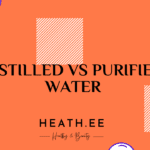Water is essential to life, but not all water is created equal. In terms of quality, there are two main types of water: distilled and purified. Although these two terms are sometimes used interchangeably, they actually refer to two distinct processes. In this blog post, we’ll explore the differences between distilled and purified water, so that you can make the best choice for your needs.
What is Distilled Water?
Distilled water is water that has been boiled and then condensed into a clean container. This process removes impurities, such as heavy metals, minerals, and other contaminants, from the water. The boiling process also kills any bacteria, viruses, and other microorganisms that may be present in the water.
Distilled water is often used in medical and laboratory settings, as it is free of impurities and contaminants. It is also used in the production of certain foods, such as baby formula and juices.

What is Purified Water?
Purified water is water that has been filtered to remove impurities. This process typically uses a series of filters and membranes to remove particles, such as sediment, bacteria, viruses, and other contaminants.
Purified water is often used in drinking water systems, as it is free of contaminants and impurities. It is also used in the production of certain foods, such as ice cream and canned goods.
How Do They Differ?
The main difference between distilled and purified water is the process used to remove impurities. Distilled water is boiled to remove impurities, while purified water is filtered.
Distilled water is free of bacteria, viruses, and other microorganisms, while purified water may still contain some microorganisms. Additionally, distilled water is free of minerals, while purified water may still contain some minerals.

Benefits of Distilled Water
Distilled water is free of impurities, bacteria, viruses, and other contaminants. This makes it ideal for medical and laboratory settings, where it is important to have water that is free of contaminants.
Distilled water is also free of minerals, which makes it ideal for certain applications. For example, it is often used in car batteries and steam irons, as minerals can cause damage to these appliances.
Benefits of Purified Water
Purified water is free of contaminants and impurities, making it ideal for drinking water systems. This makes it a great choice for households, as it is safe and free of contaminants.
Purified water also contains some minerals, which can be beneficial for health. Additionally, purified water is often less expensive than distilled water, making it a more cost-effective choice.
Which is Better?
The answer to this question depends on your needs. If you need water that is free of impurities, bacteria, and viruses, distilled water is the best choice. However, if you need water with some minerals, purified water may be a better choice.
Conclusion
Distilled and purified water are two types of water that are used for different purposes. Distilled water is boiled to remove impurities, while purified water is filtered to remove contaminants. Distilled water is ideal for medical and laboratory settings, while purified water is ideal for drinking water systems. Ultimately, the best choice for you depends on your needs.



